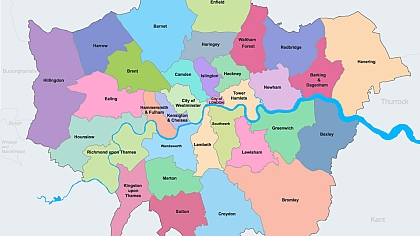10 Reasons to Study in the UK for International Students
When you're thinking about going to university, deciding where to study can be a daunting task, especially if you're considering an international degree. Also, when you weigh the pros and cons of studying in the UK or any other country, parents and students are likely to have different priorities, so it's important to consider all factors.

The UK is one of the most popular destinations for higher education, with more than 400,000 international students enrolling each year. To make your admission go smoothly, let's take a look at why choosing to study in the UK is the right decision.
Excellent International Reputation
UK institutions are consistently ranked among the best in the world, and their degrees are respected and recognized around the world by employers, governments, and academic institutions for their academic excellence. This standard of quality is set by some of the oldest universities with recognizable names, such as Oxford and Cambridge, but the tradition extends to many universities and colleges across the UK.
Choose to study in the UK, and your resume is sure to stand out in job searches and put you above your peers when you return home.
Universities in the UK consistently rank at the top of world university rankings, and many have a reputation for global leadership in teaching and research. World-renowned experts in a wide variety of fields often visit UK universities to give classes and lectures. Many of the world's leading scholars teach at UK universities, which means that if you study in the UK, you may be taught by an academic who wrote the textbook you use in class.
Flexibility and Diversity
One of the most compelling reasons to study in the UK is diversity: there are 50,000 different programs of study on the UCAS website. Subject areas range from agricultural sciences and architecture to social sciences and sports, and the extraordinary variation in each field ensures that students can always find the degree that best fits their needs and interests.
In addition, most institutions offer flexibility within a subject area, and most allow you to tailor your program of study to suit your preferences. A great example of this is the combined honours programs, which allow students studying in the UK to combine two areas of interest into one degree: economics and international relations, business, and marketing, or politics and law.
The teaching style and teaching methodology used in the UK give you the freedom to be creative and develop skills and confidence in a way that suits you as an individual.
Unique Degrees
With so much variety, many careers probably don't exist in your country, so studying in the UK is second to none.
Many people want to study in the UK to gain access to specific subjects; for example, several universities on the south coast offer degrees related to the maritime industry that guarantee employment through a niche market - some programs are even more specific!
Circus performance, Viking studies, baking technology, surfing, equine psychology, brewing and distilling, floral design, and puppetry are just a few other unique degrees for those considering studying in the UK.
Quality

UK universities are regularly inspected to make sure they meet the high standards of teaching, learning, and research set by the government. The Quality Assurance Agency for Higher Education (QAA) is the main body responsible for maintaining these standards. In addition, the annual National Student Survey publishes alumni feedback on student satisfaction and employment outcomes. When researching your studies in the UK, you can get the kind of information that will help you make your choice.
Working While Studying
In addition to the fact that studying in the UK is cheaper than in the US and Australia, the fact that students are allowed to work means that studying in the UK is even more affordable, as EU students currently have no restrictions and can work without a visa.
The national minimum wage for workers between the ages of 18 and 20 is £6.45 and increases to £8.20 by age 21. Most students studying in the UK who want to work will easily find part-time work, and it's not only a great way to ease their financial situation, but also to gain invaluable work experience.
Employment
This aligns well with graduate employment opportunities. By studying in the UK, students have the opportunity to develop skills, knowledge, critical thinking, and connections for future careers. Most universities offer practical courses that prepare students for the workplace and can offer internships, internship years, and industry projects that foster connections and contacts in the industry.
A Great Opportunity to Improve your English
The UK is the home of the English language, so studying in the UK is an ideal way to develop your language skills and improve your job prospects. English is the primary language for more than 400 million people around the world and plays an important role in science, technology, and the economy. And because English is the language of international business, the ability to speak it fluently is essential not only for work in the UK, USA, Canada, and Australia but also for working in international organizations anywhere in the world.
Thousands of people of all ages choose to study in the UK just for language courses; a university education in English turns most students into multilingual global citizens.
A Safe Place to Live

Police do not carry guns, and there are strict controls on firearm possession; for parents considering allowing their children to study in the UK, this is an important consideration. There are millions of CCTV cameras in UK cities, and many public and private services are regulated to ensure customer safety.
The country does not suffer from severe weather such as hurricanes or tornadoes, or natural disasters such as earthquakes, avalanches, and severe flooding, and there are absolutely no dangerous or poisonous animals roaming here!
Cultural Diversity of International Students
When considering studying in the UK, you are also faced with a choice of country: England, Scotland, Northern Ireland, or Wales. Each country has its own distinctive culture with differences in history and tradition, language and dialect, and even in food and drink. The cosmopolitan metropolitan cities of London, Cardiff, Belfast, and Edinburgh contrast with the small villages and countryside, which change from one end of the country to the other.
England has the most higher education institutions, but each country has its appeal, so assess your options for studying in the UK with an open mind.
One-Year Master's Degree
Master's degrees in the UK take one year to complete compared to two years in the U.S. and other countries, which is a great reason to study in the UK for graduate school. This means that graduate study is challenging and intense, but UK universities provide a stimulating and supportive environment in which students can excel, developing interpersonal skills as well as academic skills. Teaching and learning methods allow students to pursue their interests, giving them the autonomy to choose specific modules.
As with undergraduate programs, there is a great deal of flexibility in graduate study in the UK. Students can start by enrolling in a postgraduate course (PG Dip), then transfer to a master's or take an MRes (Research Masters) course, which can lead to a PhD.
With so many factors, as well as world-class teaching and facilities, it's no wonder so many international students choose to study in the UK. Higher education at its best!

If you were lucky enough to visit London, why not write about it in your essay? You can use various approaches and storytelling techniques to create a picturesque and exciting story your professor will enjoy reading. So, what can you tell in the essay to make it great?
Read the requirements and collect information.
First, read the assignment carefully and ensure you have fully understood what the professor expects you to write in your essay. Note the number of words you must write and specific topics you must address. This information will be necessary in the planning stage. Some professors may ask you to write a reflective or informative essay, so you must consider that each type requires a different approach to the same topic.
If a lot of time has passed since the trip, you may need to do some research to recall the names of landmarks and places you have visited. Look at the photos and videos you’ve made during your trip to make the picture complete. If it’s hard for you to write an essay, get write my essay help from professional writers who will help you with essay content, structure, and format according to requirements.
Focus on a specific topic.
If your professor hasn’t specified what kind of experience you should tell in the essay, you have a room of ideas to choose from. Here, we have collected points you can focus on while writing to make your paper more interesting.

- Write about attractions. Describe a specific sightseeing experience or make a list of landmarks that captivated you the most. Maybe you have highly enjoyed visiting the British Museum, The London Eye, or Madame Tussauds? You can focus on a single scene or write about several attractions that impressed you the most. Describe it as detailed as possible so the reader can vividly imagine your experience.
- Share tips for visiting London. This topic allows you to write about the best places to eat, museums to visit, and other places to see. You can also discuss transportation and further details that may be helpful for those who plan to visit London too.
- “Why do I want to come back and see London again?” If you choose this topic, it will help you address the most touching points you have experienced during your trip, including people, culture, buildings, cuisine, and other things that have positively impressed you during your visit to London.
- Share personal reflections. How has the trip impacted you personally? Maybe you have learned something new or gained new insights or perspectives on life. In your essay, you can discuss how this trip has shaped your view of travelling and how you may treat your future travel experiences.
- Describe a challenging event. Don’t focus only on negative experiences; you can discuss them in your writing, as it’s also a part of your trip. You can write about problems with logistics, language barriers, weather variability, tourist scams, event cancellations, cultural differences, and other challenges to any tourist in London.
- Share culinary experiences. Here, you can share your culinary adventures, tasting local cuisine and dishes you have tried. Have you ever tasted it before? What dish was the most memorable and why? If you know the history of a particular dish, share your knowledge in the essay to make it more attractive to the reader.

Make an outline (and stick to it!).
Every good essay writing starts with an outline. Take some time to develop a short plan for your future essay. Think about what experiences about your trip to London you will include and what attractions you wish to mention. Remember that a good piece will have an introduction, a main body (with paragraphs per one idea), and a conclusion. Here is a sample of a brief plan that you can use for won writing:
Topic: Why I Can't Wait to See London Again
Introduction. Write brief information about your trip. Why have you chosen London as a final destination? What was the purpose of your trip? Try to make the opening paragraph exciting and invite the reader to proceed to the next part.
Paragraph 1. Describing the London Eye and the charming view of the city and architecture.
Paragraph 2. Share gastronomic experiences and unique flavours of street food.
Paragraph 3. Reflect on your connection with the city, culture, and atmosphere.
Paragraph 4. Discuss the places you plan to explore if you will return to London and why.
Conclusion. Highlight the central experiences and explain to the reader why London is a must-visit city.
If you find writing the first draft too complicated and you will need an expert for help, read an Essayshark review to ensure your work is in good hands. Don’t be afraid to ask for help when needed, and trust professional writers to get a quality paper.
Edit and proofread your text.
When the first draft of your masterpiece is ready, take some time to reread and edit it. Along with grammar and punctuation, make sure you correctly write the names of attractions and historical places. Ensure you hit the required word limit and all your ideas sound clear.
Writing an essay about your trip to London may be a great way to reflect on your experiences and capture your memories in written form. We hope our guide will help you easily share your adventures in London with others.






















